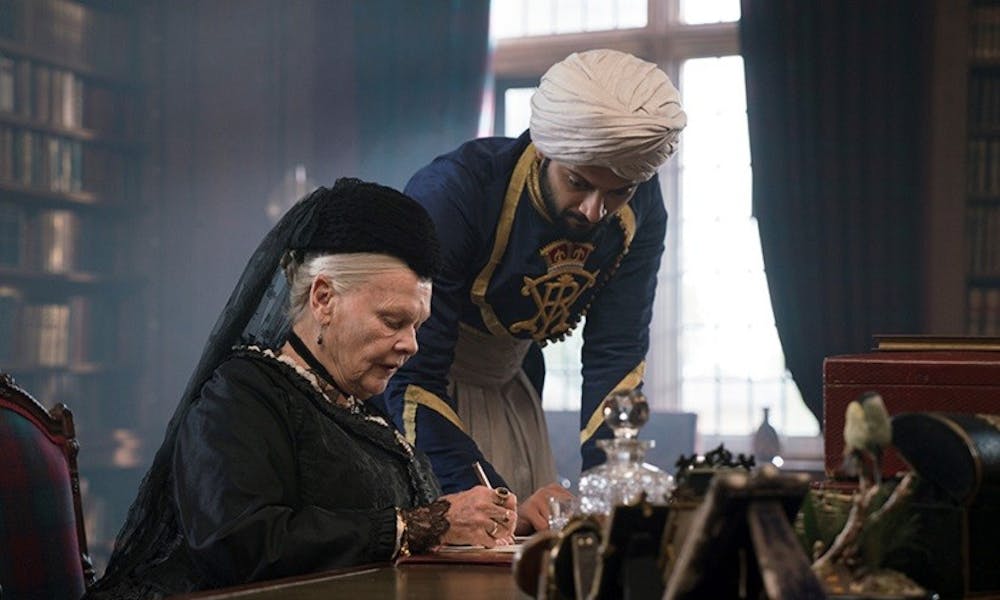‘Victoria & Abdul’ explores a covered-up historical friendship
When Queen Victoria died in 1901, the royal household immediately expelled Abdul and destroyed all evidence of their relationship. It would be another 109 years before proof of Abdul’s existence would re-emerge.

When it comes to withstanding history’s eternal test of time, the “winners” go on to influence endless numbers of future generations while the “losers” are swept under the rug and banished into the dust of oblivion. Until 2010, the story of Abdul Karim seemed destined to be one of the latter. “Victoria & Abdul,” the cinematic presentation of his unlikely 14-year friendship with Queen Victoria of the United Kingdom, aims right for the heart to tell a warm, uplifting story about the unexpected places friendship can take us.
In 1887, Abdul Karim, a clerk at a prison in Agra, India, is selected to participate in the Golden Jubilee of Queen Victoria at Windsor in England. Assigned to present the gift of a ceremonial coin to the world’s then-longest-serving monarch, he is repeatedly reminded of his place as a second-class servant of the crown. That is, until he catches the Queen’s attention at dinner when he makes eye contact with her during his presentation. She immediately elevates him to the position of personal footman. By the time she declares him a Munshi (teacher) who will give her Urdu lessons and get his own personal assistant, it becomes clear to the Queen’s household that this is not an ordinary royal-and-commoner relationship.
Dame Judi Dench is predictably charming as the Queen. An imperial hostess who knows how to expertly shut down disobedience and criticism with razor-sharp quips, the Queen is also worn down and lonely. Her responsibilities weigh on her and, the more she outlives her deceased husband, King Albert, the more she loses her will to live. Her Majesty slouches, goes about her daily routines mechanically, and appears to be in a constant state of sleepiness that indicates she’s not entirely present in the moment. But as her relationship with Abdul changes her, Dench uses mannerisms to convey the return of the Queen’s vitality. As Her Majesty, Dench’s eyes light up, she becomes more energetic and less tense. Because of the rejuvenation Abdul gives her, Victoria becomes more assertive in how she wants things done and will not let anyone stand in her way, whether it’s the jealous servants or her greedy son, Bertie.
Ali Fazal is infectiously captivating as Abdul. A man who only ever envisioned a lowly existence for himself given the time and the place he was born into, Abdul treats his time with the Queen as a kind of once-in-a-lifetime adventure and doesn’t take it for granted. A devout Muslim, one of his go-to Quran verses is about finding purpose in serving others. During his 14 years in England, he embodies this verse in his relationship with the Queen. Abdul becomes protective of the Queen to the point that he won’t leave England until one or the other dies. When her time comes, his devastation is heartbreaking, and the broken heart it gives him leads to his own death eight years after hers.
The film opens with the title card, “Based on true events … mostly.” This immediately establishes that the film won’t take itself too seriously, as historical biopics tend to. Therefore, neither should the audience. The film just wants the audience to sit back and enjoy the show for what it is. “Victoria & Abdul” turns out to be incredibly funny a majority of the time, milking the awkwardness of moments of the royal household’s intolerance and ignorance for laughs. At the same time, however, the film doesn’t forget how tragically everything crashes down for Abdul in the end, those particular scenes being potent with loss.
When Queen Victoria died in 1901, the royal household immediately expelled Abdul and destroyed all evidence of their relationship. It would be another 109 years before proof of Abdul’s existence would re-emerge. While the cinematic adaptation of those discoveries in “Victoria & Abdul,” may be too lightweight for some, given the context of its imperialist time and place, it nonetheless succeeds in showing how shared happiness can be a true lifesaver.
'Victoria & Abdul' is rated PG-13 and showing now in theaters.
More from The Rice Thresher

Beer Bike canceled due to weather concerns
Despite talk of rain and a possible ‘Beer Run,’ the Beer Bike races seemed like they were proceeding as normal on Saturday. Alumni races were well underway at noon. At 1:30 p.m., the women’s teams were teeing up for their second heat when, under sunny skies, the races abruptly stopped.

‘Will we survive? Will the movement survive?’
Rice Students for Justice in Palestine staged a demonstration April 8. Students walked out in protest of various issues including the detainment of international students; diversity, equity and inclusion rollbacks; ongoing “U.S.-backed genocide” in Palestine; transgender rights and federal funding cuts at the Central Quad from 11 a.m. - 2 p.m.

The Hoot to close after 15 years of late night service
After 15 years in business, the Hoot will shut down at the end of the semester. The Hoot has faced staffing and financial challenges since the COVID-19 pandemic, and has reached a point where operations are “no longer sustainable,” Hoot management wrote in an April 8 Instagram post.

Please note All comments are eligible for publication by The Rice Thresher.